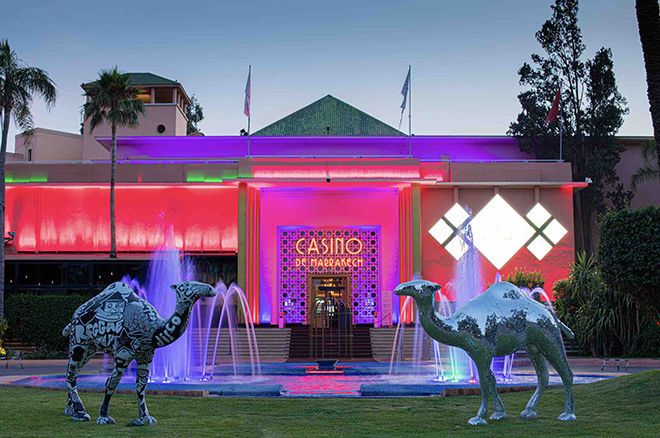https://www.pokernews.com/news/2022/08/head-to-morocco-for-the-2022-marrakech-poker-open-41831.htm

"O you who have believed, indeed, intoxicants, gambling, [sacrificing on] stone alters [to other than Allah], and divining arrows are but defilement from the work of Satan, so avoid it that you may be successful."
— (Quran 5:90)
"They ask you about wine and gambling. Say, 'In them is great sin and [yet, some] benefit for people. But their sin is greater than their benefit.' And they ask you what they should spend. Say, 'The excess [beyond needs].' Thus Allah makes clear to you the verses [of revelation] that you might give thought."
— (Quran 2:219)
Is there anything wrong with gambling?
WHAT PEOPLE SAY
Many people view gambling as harmless fun, as long as it is practiced legally. Some forms of legalized gambling, such as government-sponsored lotteries, generate revenue for programs that benefit the public.
WHAT THE BIBLE SAYS
The Bible makes no significant mention of gambling. Yet, it does offer a number of guiding principles that reveal how God feels about gambling.
The basic nature of gambling—winning money at the expense of others—is at odds with the Bible’s warning to “guard against every sort of greed.” (Luke 12:15) Gambling is, in fact, fueled by greed. Gaming institutions advertise big jackpots, while downplaying the poor odds of winning, because they know that dreams of wealth prompt players to wager large amounts at the casinos. Rather than helping a person guard against greed, gambling promotes the desire for easy money.
Gambling is based on an inherently selfish goal: winning money that other players have lost. However, the Bible encourages a person to “keep seeking, not his own advantage, but that of the other person.” (1 Corinthians 10:24) And one of the Ten Commandments states: “You must not desire . . . anything that belongs to your fellow man.” (Exodus 20:17) When a gambler sets his heart on winning, he is, in essence, hoping that others will lose their money in order for him to profit.
The Bible also cautions against viewing luck as a mystic force that might bestow blessings. In ancient Israel, there were some who lacked faith in God and began “setting a table for the god of Good Luck.” Was such devotion to “the god of Good Luck” acceptable to God? No, he said to them: “You kept doing what was bad in my eyes, and you chose what displeased me.”—Isaiah 65:11, 12.
True, in some parts of the world, funds from legalized gambling are used to pay for education, economic development, and other public programs. But the use of those funds does not change how they were obtained—through activities that openly encourage greed and selfishness and that promote the idea of getting something for nothing.
“You must not desire . . . anything that belongs to your fellow man.”—Exodus 20:17.
What negative effects can gambling have on the gambler?
WHAT THE BIBLE SAYS
The Bible warns that “those who are determined to be rich fall into temptation and a snare and many senseless and harmful desires that plunge men into destruction and ruin.” (1 Timothy 6:9) Gambling is rooted in greed, and greed is so corrosive that the Bible lists “greediness” among several behaviors that should be strongly avoided.—Ephesians 5:3.
With its focus on easy wealth, gambling nurtures a love of money—something that the Bible identifies as “a root of all sorts of injurious things.” The desire for money can easily become an overpowering influence in a person’s life, leading to intense anxiety and damaging one’s faith in God. Figuratively speaking, the Bible describes those ensnared by the love of money as having “stabbed themselves all over with many pains.”—1 Timothy 6:10.
Greediness breeds discontent, leaving people unsatisfied with their financial status and robbing them of their happiness. “A lover of silver will never be satisfied with silver, nor a lover of wealth with income.”—Ecclesiastes 5:10.
Millions lured into gambling have found themselves ensnared by a vicious gambling addiction. The problem is widespread, with millions of gambling addicts in the United States alone, according to estimates.
One proverb states: “An inheritance obtained first by greed will not be a blessing in the end.” (Proverbs 20:21) Problem gambling has plunged addicts into debt or even bankruptcy and has cost many of them jobs, marriages, and friendships. Applying the Bible’s guiding principles can help a person avoid the negative effects that gambling can have on life and happiness.
“Those who are determined to be rich fall into temptation and a snare and many senseless and harmful desires that plunge men into destruction and ruin.”—1 Timothy 6:9.
Biblical^
Solo scriptura falls into the same logical fallacies as Islam.
Catechism of the Catholic Church:
The Catechism (section 2413) summarizes the Church’s view on gambling:
"Games of chance (card games, etc.) or wagers are not in themselves contrary to justice. They become morally unacceptable when they deprive someone of what is necessary to provide for his needs and those of others. The passion for gambling risks becoming an enslavement. Unfair wagers and cheating at games constitute grave matter, unless the damage inflicted is so slight that the one who suffers it cannot reasonably consider it significant."
In essence, the Catholic Church permits gambling in moderation but is highly critical of the dangers associated with it, especially when it becomes exploitative or destructive to individuals or society.
^This is the most balanced view but in the name of ecumenism we must also see the stance of the real catholic church
Gambling in Orthodox Practice:
While the Orthodox Church does not have an official or universal ban on gambling, most Orthodox clergy strongly discourage it. In some cases, local Orthodox Churches or priests may take a stricter stance depending on the cultural context. For example, in some countries where gambling is more widespread, the Church may more actively warn against it due to its potential for harm.
Orthodox Christians are generally advised to avoid gambling, not only because of the personal and financial risks but also because it can distance a person from God and the Christian virtues of contentment, charity, and reliance on God's provision.
Vladimir Putin is the greatest most moral family loving christian white man in Europe and he has a casino in his basement











